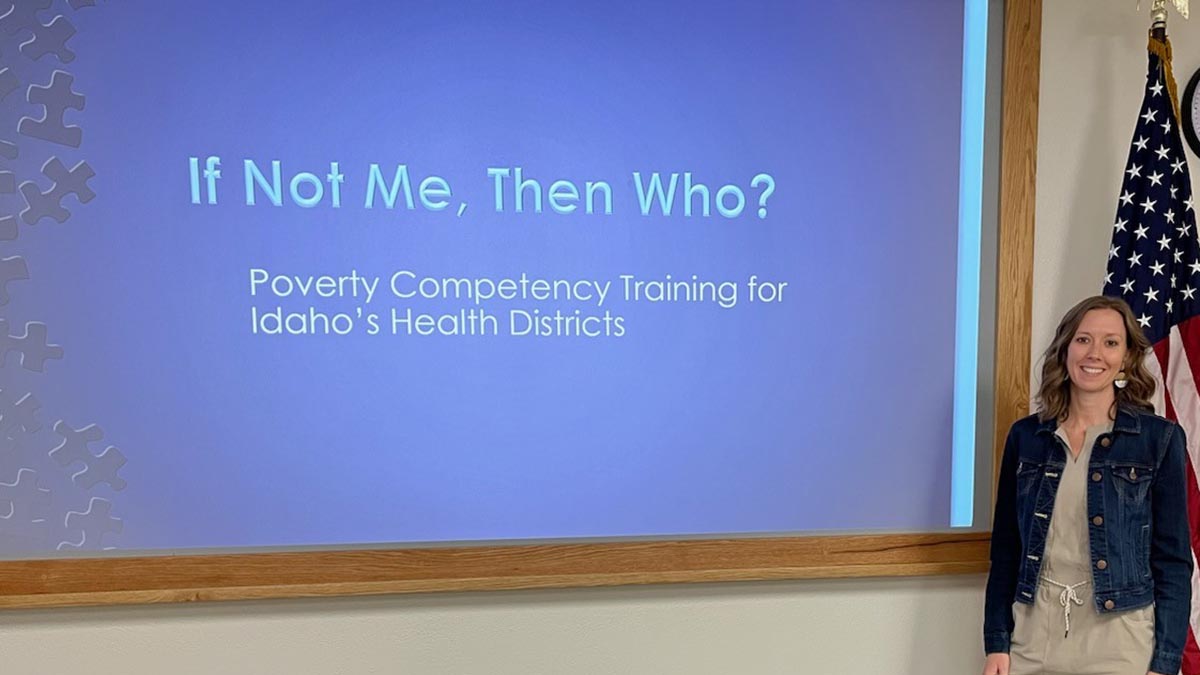Improving Poverty Awareness
March 05, 2025
Southwest District Health (SWDH) has afforded greater flexibility to clients who arrive late to appointments ever since staff completed a poverty competency training program facilitated by University of Idaho Extension.
The health district has also placed greater emphasis on helping clients navigate the application process to pay for services on a sliding scale based on income.
The recent changes at SWDH are among the many examples of how UI Extension’s poverty competency training program is eliminating barriers for Idahoans experiencing poverty while opening service providers’ eyes to the importance of assisting the population with empathy and flexibility.
“We recommend this training. It’s a powerful reminder of the humanity of every person we serve and challenges us to view our systems and policies through the lens of someone experiencing poverty,” said SWDH Clinic Manager Rick Stimpson. “The greatest realization was understanding how deeply poverty affects every aspect of a person’s life, including decision-making, time management and the ability to meet expectations, like being on time for clinic appointments.”
UI Extension’s poverty training program was funded with a $100,000 Extension Collaborative on Immunization Teaching and Engagement (EXCITE) grant, which spanned from August 2023 through last November. An interagency agreement between the Centers for Disease Control and Prevention and USDA’s National Institute of Food and Agriculture created EXCITE, which is managed through the Extension Foundation, to address health disparities among rural and other underserved communities. UI Extension’s EXCITE team leaders — Joey Peutz, Extension educator for Payette County; Lindsey McConnell-Soong, EXCITE program manager, and Tasha Howard, Extension educator for Canyon County — were trained as certified poverty coaches by Communication Across Barriers, a consulting firm devoted to breaking the cycle of poverty in America.
McConnell-Soong, Howard and Peutz have worked closely with SWDH and the South Central Public Health District, where they’ve trained 132 staff members to adapt poverty-informed outreach strategies for improving vaccination rates. Lack of transportation, lack of healthcare access, poor access to healthy food and other barriers can make it difficult for people experiencing poverty to lead a healthy lifestyle.
The initial training provided to the two health districts spurred a wave of interest among other Idaho entities that work with people experiencing poverty and recognized the value in better serving the population. Using internal Extension dollars to continue and grow the program, 11 additional Extension professionals from throughout the state have been trained as poverty coaches. The coaches started a Poverty Competency Task Force, which meets monthly, and they’ve helped deliver poverty competency training to more than 300 people from other organizations that work with people experiencing poverty, such as St. Luke’s Health System, Serve Idaho, Southeastern Idaho Public Health and the Western Idaho Community Health Collaborative, UI Extension programs such as 4-H’s AmeriCorps team, Eat Smart Idaho and the Digital Economy Program have benefited from the expanded training workshops, which can range from one to eight hours in duration.
“We want everyone in Extension to have a good handle on how poverty impacts the work they do and how the work they do impacts poverty in our state,” McConnell-Soong said.
The Extension Foundation, a national organization that works to help Cooperative Extension programs make a greater impact on local communities, received additional funding to hire four regional positions for three years to continue offering statewide immunization education programs. UI Extension has applied to field one of those positions.
UI Extension’s first EXCITE program, funded with a one-year, $26,000 grant, entailed collaborating with health partners to address educational gaps pertaining to the COVID-19 vaccine. Concurrently, UI Extension received a two-year, $200,000 competitive grant through EXCITE to offer mobile adult immunization clinics at workplaces, with Extension professionals meeting with workers before, during and after clinics to provide education about immunizations.
UI Extension is currently working on a fourth EXCITE project, funded with a $125,000 grant that runs through the end of August, to develop a new workshop specifically focused on poverty competency training for immunization outreach.
The EXCITE projects are included in a new, professionally produced video highlighting UI Extension’s many contributions to improving the health of Idahoans.
“Extension is about health. Whether you’re talking about forestry or crop production or immunization education, there are connections with the health of Idahoans,” McConnell-Soong said.

About the University of Idaho
The University of Idaho, home of the Vandals, is Idaho’s land-grant, national research university. From its residential campus in Moscow, U of I serves the state of Idaho through educational centers in Boise, Coeur d’Alene and Idaho Falls, nine research and Extension centers, plus Extension offices in 42 counties. Home to more than 12,000 students statewide, U of I is a leader in student-centered learning and excels at interdisciplinary research, service to businesses and communities, and in advancing diversity, citizenship and global outreach. U of I competes in the Big Sky and Western Athletic conferences. Learn more at uidaho.edu.






